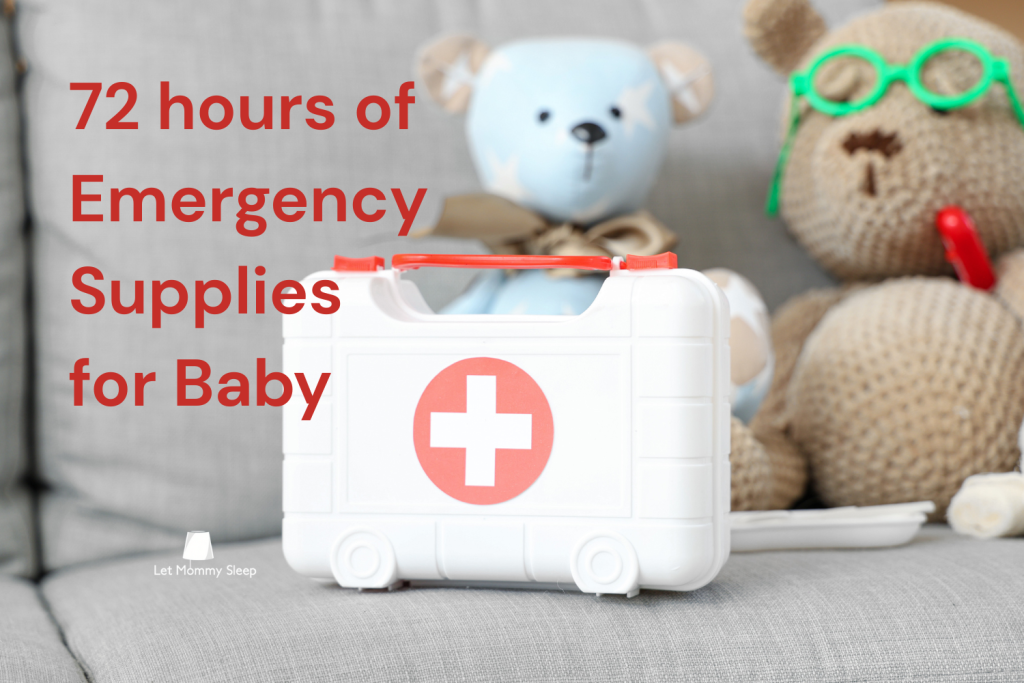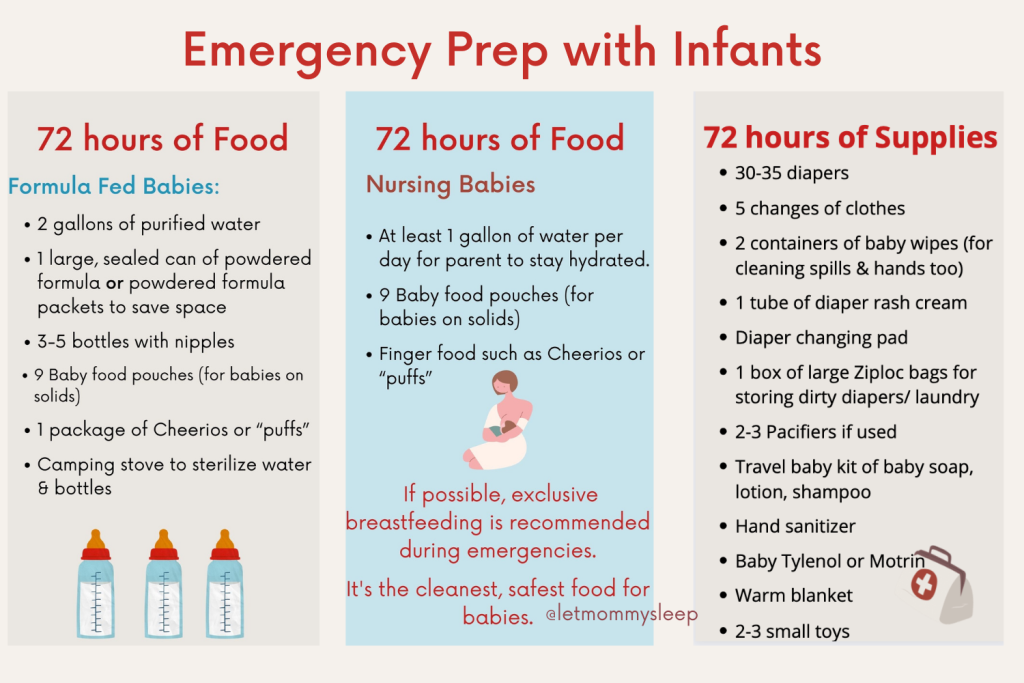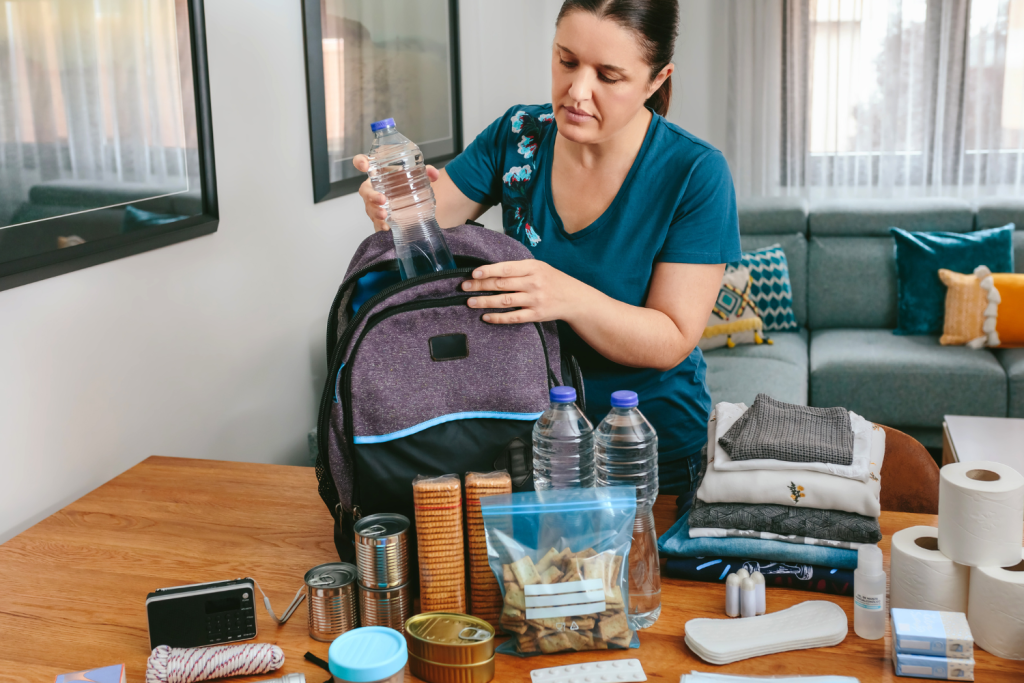Emergency Preparedness with Infants
updated June 27, 2025 – When an emergency strikes, the Department of Homeland Security and FEMA suggest having food, water and other supplies to last your family for at least 72 hours (3 days). Our night nurses and postpartum doulas describe the essentials of newborn, infant and baby care items in Emergency Preparedness with Infants.
Emergency Preparedness with Infants – What are the top 3 baby care items to have?
Newborns and infants need to have emergency items on hand in case unexpected situations arise. The top 3 items are:
- diapers – A general guideline is one diaper for every two hours
- feeding items – bottles, formula, purified water if not exclusively breastfeeding
- baby wipes – Wipes clean you baby and can also be used to clean surfaces if there are no other options.
Our team of night nurses and doulas recommend a good old fashioned hiking backpack so your arms are free to carry or wear your infant. Diaper bags might not work as you’ll need room to carry water and enough clothing and diapers for 3 days.

A 72 Hour Emergency Kit for Babies should contain the following:
- 2 gallons of nursery or purified water
- At least 1 gallon of water per day for nursing moms.
- 1 large, sealed can of powdered formula (more than enough for 3 days) or consider powdered formula packets to save space
- Formula scoop if not included with the can
- 3-5 bottles with nipples
- Baby food pouches (for babies that eat solids)
- Finger food such as Cheerios or “puffs” (for babies that eat solids)
- Camping stove (may be necessary to sterilize and clean bottles.)
- 30-35 diapers – here is how to know if your newborn or infant is eating enough
- 2 large containers of disposable baby wipes (for diapering needs and also for cleaning spills, hands, and bodies.)
- Diaper rash cream
- Diaper changing pad
- 2 boxes of sealable plastic bags (like Ziploc) for storing dirty diapers and laundry
- Pacifiers (if your baby uses them)
- Clothing:
- 5 seasonal changes of clothes (combination of onesies, pants, footed one-piece outfits)
- 3 footed pajamas
- Sleep sack or swaddle
- Seasonal items such as hats, socks and mittens.
- Swaddle blanket
- 5-6 burp clothes or washcloths
- Travel baby kit with baby soap, lotion, shampoo
- Hand sanitizer
- Baby Tylenol or Motrin
- Warm emergency blanket
- Hand warmers
- 2-3 small toys

Emergency Preparedness with Infants: More than Supplies
Planning for possible scenarios like power outages, natural disasters, or evacuations is also critical. Know your local evacuation routes and shelters, especially those equipped to help families with infants. Also consider how you would safely transport your baby in an emergency, and keep a car seat and baby carrier readily accessible. In addition to having a plan in place, being prepared with the “how” as well as the “what” not only keeps your family and baby safe but also helps reduce panic during unpredictable situations.
Knowing how to help in emergencies such as choking or a burn is also a form of preparation. To get the basics of these skills visit Essential First Aid Skills for New Parents
If you need to leave your home your go-bag should have:
- Baby carrier (wearing a baby can be invaluable)
- Additional toys
- Stroller
- Jacket, coat or bunting depending on the weather
Emergency Preparedness with Infants – Don’t Forget Yourself!
In an emergency it’s natural for parents to put all their efforts toward their newborns and infants but we want to be sure that you have the nutrition and preps you need to stay strong and focused too.
Water – All major resources recommend storing 1 gallon of water per day, per adult. So at least 3 gallons of water for 72 hours for drinking and daily tasks like brushing our teeth.
Phone Charger – Your phone is a crucial means of communication. It can keep also keep toddlers and older kids calm and occupied during an emergency. A solar powered phone charger can give you peace of mind if electricity goes out or is unavailable.
Disinfecting Wipes – Emergency situations might mean being in close quarters with others. Sanitizing surfaces can help keep everyone healthy and clean.
Non- Perishable Food – Parents and adults need foods that won’t spoil to keep their energy up and stay strong. Power Bars, granola bars, canned fruits, canned meats and powdered milk are great examples.

As your family grows and changes, emergency preparedness kits will need to be updated. For example, a newborn would require a different diaper size, nipple, and clothing than a 10-month old. Check in on your 72-hour kit every 4-6 weeks to update, test or change out the items. And of course if you have twins or more than one child, your kit will be double in size.
For everyday safety when there’s not an emergency, visit Creating a Safe Nursery for Baby to create a babyproofed and healthy environment for your baby.
Categories
- Corporate Care & Partners
- COVID19 Archive
- En Espanol
- Expert Guides
- Hiring a Night Nanny
- Infant Safety
- Infant Sleep Hub
- Newborn Care
- Postpartum Health
- Twins & Multiples
- Work as a Night Doula
- zPost Archives
